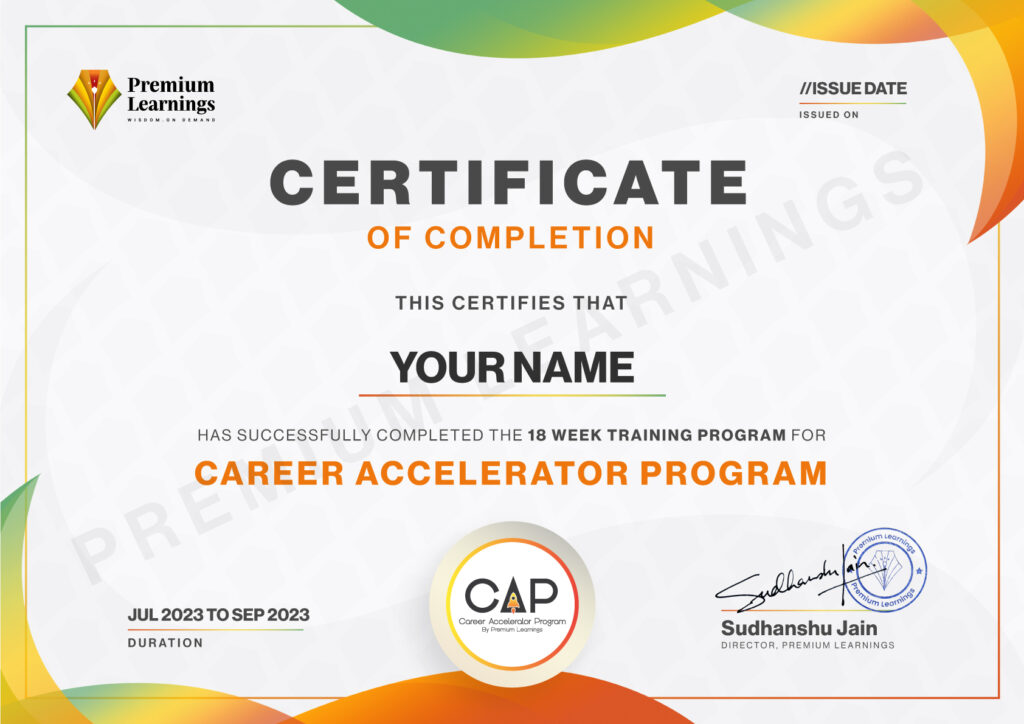Master Career Accelerator Program


Mr. Sudhanshu Jain - Chief Mentor & Managing Director of Premium Learning Systems


Ms. Neha Saxsena - Technical Trainer
Duration
15 weeks
Modules
8
Quizzes
16
Live Projects
4
Language
Hinglish (Hindi + English)
Course Level
Intermediate
Training Certificate
Yes
Dedicated Job Portal Lifetime Access
What is Salesforce ?
Discover the power of Salesforce Training through our premium learning certification courses! You’ll become proficient in essential Salesforce concepts like Service Cloud, Sales Cloud, Salesforce objects, quote templates, lightning components, reports, and data management. Gain practical experience with industry-based projects and receive expert guidance to excel in mock interviews and craft a winning resume, securing high-paying job opportunities in this rapidly expanding field! Salesforce opens doors to lucrative careers across diverse industries, making it an exciting and rewarding choice for your future!
Who can go for this Salesforce Certification?
- Graduates (Technical and non-technical background)
- Working professionals (Any field)
- Students
- IT professionals who want a career switch
- IT aspirants with career or educational gaps
- Women who want to restart their career journey
- Anyone who is willing to work hard for joining one of the most in-demand IT fields


- 3-Step Framework: Secure multiple job opportunities with highly paid skills.
- K.P.E. Framework: Excel in technical interviews.
- Top 5 Skills: Learn the most lucrative skills in the market.
- Career Roadmap: Guidance to grow in cloud computing like Salesforce.
- Secret Hacks: Tips to prepare and excel in your career.
What can you achieve by doing our Salesforce Career Accelerator Program?
- You will get a variety of career options in Salesforce Certification
- Your market value will rise after completing the Online Salesforce Certification Course.
- You can get premium salary packages with the Salesforce Certification.
- You can get professional flexibility by doing an online Salesforce Course.
- You can improve Your Creativity and Skills with an Online Salesforce Certification.
Course Overview
So, are you ready to take your career to the next level? Look no further than the Online Salesforce Career Accelerator Program – Salesforce Development Mastery. This 15-week intensive online Online Salesforce course is designed for professionals with 0-6 years of experience looking to excel in the rapidly-growing field of Salesforce development, regardless of their background.
Our expertly crafted curriculum is tailored to provide a comprehensive understanding of Salesforce development, including core Java, HTML, CSS, Salesforce Administration, Apex Development, Lightning Aura, and Lightning Web Components (LWC). Led by industry-leading experts with years of experience in Salesforce development, the course is taught in easy-to-understand HinGlish (Hindi + English) to ensure that everyone can follow along.
Throughout the course, you’ll work on real-world projects that will give you hands-on experience with the latest technologies and frameworks, and be groomed for interviews to help you land your dream job.
But the training doesn’t stop there. Upon completion of the course, you’ll be required to pass a test and participate in a short interview to demonstrate your knowledge and skills. Successful graduates with 0-6 years of experience will also be eligible for our comprehensive recruitment assistance program, which provides support to help you secure a job in the Salesforce development industry.
Don’t let your background hold you back from reaching your full potential. Sign up for the Career Accelerating Program – Salesforce Development Mastery today and start your journey to becoming a Salesforce developer .
Key Highlights
- Course Completion Certificate
- Multiple Projects, case studies and assignments
- Flexible Schedule
- Lifetime Job Assistance through our Job portal
- 1 year support through Mentorship calls
- Highly engaging Self -paced learning content
- Lifetime job portal access
- One year access of course content and our expert doubt community
Course Syllabus
Week 1
Session 1: Admin Basics
- Types of Relationships
- One To Many
- Difference between Master-detail and lookup relationship
- RollUp summary field
- Schema Builder
- Many To Many relationships
- Project Discussions
Session 2: Admin Basics
- Data Modelling – classroom exercises
- Formulae Fields
- Type of interview questions in Salesforce Technical interview
Session 3: Admin Basics
- Validation rules
- Most common Business cases of Validation Rules
Session 4: Salesforce Analytics
- Salesforce Analytics
- Dashboards
- Reporting snapshots
- About Trailhead
- Validation Rules – Data consistency
Session 5: Admin Basics
- Lookup Filter
Week 2
Session 1: Salesforce Analytics
- Summary Function
- Bucket field
- Custom Report type
- Report scheduling
- Folder security
- Dashboards
- Trend analysis using reporting snapshots
Session 2: Programming Basics 1
- Logic Building Roadmap
- Practice
- Check Solutions Online
- Use pen and paper
- Keep learning new things
- Be consistent and keep patience
- Face problems head – on
- Test yourknowledge in an online quiz
- Keep motivating yourself
- Revise
- Write it down
- Puzzle solving
- Have a step by step approach
- Register on Programmer’s community
Session 3: Programming Basics 2
- Java Basics
- Overview of Java
- Difference between Procedural Oriented language and Object Oriented language
- Instructions in Java
- Algorithm
- Variables
- Data Types
Session 4: Programming Basics 3
- GDB Online Compiler
- Demo of Data Type
- Operators in JAVA
- Demo of Operators
Week 3
Session 1: Business process automation
- Workflow rules
-Definition
-Rule criteria
-Evaluation Criteria
-Actions
-Governor Limits - Process Builder
-Rule criteria
-Evaluation Criteria
-More actions
-Can be called
Session 2: Business process automation
- Approval Process
- Assignment rule
- Escalation Rules
- Auto response rules
Session 3: Sales Cloud
- What is a sales cloud?
- Why sales cloud?
- What are the benefits of a sales cloud?
- Features of sales cloud
- Sales cloud data model
- Sales cloud business processes
- Assignment
- Competitors of sales cloud
Session 4: SOQL
- What is SOQL?
- Why do we use SOQL?
- Business Cases
- Simple SOQL Queries
- SOQL Clauses
- SOQL operators
- Sub Query
- Relationship Query
- Dynamic query
- Governor limits
- SOSL Examples
Session 5: Functional Salesforce
- Functional salesforce
- Lightning Experience Vs Classic
- Audit
week 4
Session 1: Flows
- Why Flows?
- What are Flows?
- Difference between Workflow, process builder, and flows.
- Types of Flows
-Screen Flow.
-Schedule-Triggered Flow.
-Record-Triggered Flow.
-Platform Event-Triggered Flow.
-Autolaunched Flow (No Trigger)
-Record-Triggered Orchestration - Screen Flow (Examples)
Session 2: Flows
- Screen Flow (Examples)
- Record-Triggered Flow
Session 3: Flows
- Record-Triggered Flow (Examples)
Session 4: Flows
- Autolaunched Flow (Examples)
- Record-Triggered Orchestration (Examples)
Session 5: Flows
- Schedule-Triggered Flow (Examples)
- Flow Test
Week 5
Session 1: Service Cloud
- Data loader
- Service cloud
Session 2: JDK installation
- JDK installation
- Eclipse installation
- Java Path setting
Session 3: VS code installation
- Vs code download
- Salesforce extension pack
- Salesforce CLI
Week 6
Session : Flow Examples
Flow 1: -Send Email to admin
Flow 2: -Post chatter account details on changes in group
Flow 3: -Recreate ScreenFlow contact button click
Flow 4: -Assignment record type prospect to customer direct
Flow 5: -use literals and variables
Flow 6: -Change rating to hot
Flow 7: -change lead name as queue
Flow 8: -Before save Flow
Flow 9: -After save flow
Flow 10: -When Account type is Prospect
Flow 11: -To owner when Opportunity is closed won
Flow 12: -Shipping address changed to mailing address
Flow 13: -Ondelete closed lost opportunity
Flow 14: -Navigate to record page of contact
Flow 15: -Manager receives email when user deactivated
Flow 16: -isChanged operator
Flow 17: -Delete closed lost opportunity on button click
Flow 18: -Autolaunch flow task creation
Flow 19: -Create contact on account
Flow 20: -Change last name
Flow 21: -Count number of Opportunity
Flow 22: -Update status from verified to closed
Week 7
Session 1: Salesforce Security Model 1
- Why do we need security?
- What is the Security Model in Salesforce?
- Type of Security Model
- Object Level Security
- License in Salesforce
- Interview Questions
Session 2:Salesforce Security Model 2
- Record Level Security
- What is Role Hierarchy?
- Field Level Security
- Restriction Rules
- Business Case
- Interview Questions
Session 3: Programming Basics 4
- Control Structure
Session 4:Programming Basics 5
- Overview of Java
- Switch Control Structure
- Loops
Session 5: Core java 1
- What is JAVA?
- Basic Structure of JAVA Program
- What happens at compile time?
- What happens at runtime?
- What is JVM?
- JAVA Platform Independent
- Java Keywords
- Java Data Types
- Variables in JAVA
- Initialisation Of Variables
- Scope of Variables in JAVA
- Operators in JAVA
Session 6: Core Java 2
- Example of Assignment Operator
- JAVA Control Statement
Week 8
Session 1:Core Java 3
- LOOPS
- USER INPUT (SCANNER)
Session 2: Core Java 4
- Array
- For each loop
- String
Session 3: Core Java 5
- Multidimensional Array
- Two Dimensional Array
- Packages
Session 4: Core Java 6
- Classes and Objects
- Methods in Java
- Constructor
Session 5: Core Java 7
- Access Modifier
- OOPs
- Polymorphism
- Difference Between Method Overriding and Method Overloading
- Interview Questions
Week 9
Session 1:Core Java 8
- Encapsulation
-What is Encapsulation
-Advantages of Encapsulation
-Points to remember - Inheritance
-Types of Inheritance
-Why java does not support Multiple Inheritance. - Interview Questions
Session 2:Core Java 9
- Abstraction
- Difference between Abstraction and Encapsulation
- Interface
- Interview Questions
Session 3:Core Java 10
- Exception Handling
- Interview Questions
Session 4:Core Java 11
- Wrapper Classes
- Difference between Primitive Data type and Wrapper Classes
- Collection Framework
Session 5:Core Java 12
- Linkedlist
- Hashset
- Hashmap
- Collection Framework Comparison Advantages of Collection
- Interview Questions
Week 10
Session 1: Apex
- What are programming tools?
- Why do we use it?
- Most common business cases of using Apex
- Modes of Deploying Apps in Salesforce
- Declarative Tools
- Programmatic Tools
- Why do we use Programming Tools?
- What is Apex?
- How many ways can we call Apex code?
- Basics of Apex
- Apex Trigger examples
Session 2: Apex
- Apex Trigger Business cases
- How to create Queues
- How to search for answers or logic?
- Account /lead triggers (before insert)
- SOQL use -out of for loop
Session 3: Apex
- What is the difference between before and after trigger?
- Why do we need After triggers?
- What is the difference between Trigger.new and Trigger.old?
- Apex trigger Examples
Session 4: Apex
- Apex trigger concepts
- Context variables
- Before Vs. After trigger
- Bulk triggers
- When are triggers not fired?
- Order of Execution
- Trigger Framework
Session 5: Apex
- Using Trigger.old and trigger.new
- Using limits – avoid duplicate creation
- Using maps – avoid deletion of child record based on parent record
Session 6: Apex
- Apex advance examples
Week 11
Session 1: Asynchronous Apex
- Synchronous apex vs Asynchronous apex
- Advantages over synchronous apex
- Types of asynchronous apex
- Future Method
- Queueable Apex
Session 2: Asynchronous Apex
- Batch Apex
- Schedulable Apex
- Exception in Apex
- Interview Questions
Session 3: HTML
What is HTML?
- What is hypertext?
- What is notepad++?
- What is markup language?
- Basic Structure of HTML
- HTML Attributes
- Heading Content tags
- Paragraph tag
- List in HTML
- Tags in HTML
- Inline text semantics
- HTML Forms
- Types of fields in the FORM
- HTML5 Types of field
- HTML5 form validation
- HTML Table
- Points to remember
Session 4: CSS
- What is CSS?
- CSS Basics
- CSS Syntax Explanation
- Types of CSS
- Styling Texts
- CSS Box Model
- Gradients
- CSS Transitions
- CSS Animations
- Applications
Week 12
Session 1: Java Script
- What is Java Script?
- Structure of JS
- Styling of JS
- Functionality of JS
- Java Vs Java Script
- How compiler works
- How interpreter works
- Why Java Script?
- Node.js and Google VS Engine
- ES6 features supported to JS
- How does a web page load?
- What is Javascript
- HTML DOM?
- Why do we use Javascript?
- Common uses of Java Script
- Different browsers use different engines
- JS Interpreter
Session 2: Java Script
- What are Identifiers?
- Rules of legal name
- What are Literals?
- How to declare Variable?
- Variable
- keywords
- Data types in JS
- JS Arrays
- JS Objects
Session 3: Java Script
- Operators in JS
- Conditional Statements
Session 4: Java Script
- LOOPS in JS
Session 5: Java Script
- Map function
- Filter function
- OOPS in JS
- ES6 Spread Syntax
- ES6 class syntax
- Function Declaration in JS
- Events in JS
- Utility Functions
Session 6: Java Script
- How do we use Java Script?
- How to access DOM elements?
- Style DOM Elements
- Differences between inner HTML, innerText, textContent
Session 7: Java Script
- ECMAScript overview
- ECMAScript Analogy
- Arrow Function in JS
- Promises in JS
Week 13
Session 1: Lightning Aura 1
- What is Salesforce?
- What is Salesforce Lightning?
- Why Salesforce Lightning?
- Difference between Salesfroce Classic and Salesforce Lightning
- Features of lightning
- What is Salesforce Lightning Platform?
- Features of Salesforce Lightning Experience
- Salesforce Lightning Components
- Benefits of Salesforce Lightning
- Demo of lightning app builder?
Session 2: Lightning Aura 2
- Salesforce lightning framework
- Aura Framework
- Why is Salesforce lightning popular?
- Why is the Salesforce lightning framework used?
- Salesforce Lightning Page
- Types of Components
- Lightning App Builder
- Salesforce Lightning Component library
- Salesforce Lightning Design System
- Lightning Application
- Demo of lightning custom component
- Files in custom component
Session 3: Lightning Aura 3
- Client Server Architecture
- Calling JS method from Component
- Attributes in JS
- Demo to use attributes and onclick event in JS
Session 4: Lightning Aura 4
- Conditional rendering using aura:if
- Aura Iteration using aura:iterator
- Calling Server Side
- Demo for aura:if
- Demo for aura:iterator
- Creation of Apex Server Side Controller
- @Auraenabled annotation
- Steps for calling server side
- Demo for server side calling
- What is enqueue Action?
Session 5: Lightning Aura 5
- Lightning Data Service (LDS)
- Data flow with Lightning Data Service
- What is force:record Data?
- Components based on LDS
- DML operation perform using LDS
- Demo of LDS
- Interview Questions of LDS
Session 6: Lightning Aura 6
- Events in salesforce
- Steps to use event
- Categorized events
- Demo of component and application event
- Aura Handler
- Event Propagation
Session 7: Lightning Aura Interview Questions
- Interview Questions and Answers
Week 14
Session 1: LWC 1
- What is Lightning Experience?
- Why Lightning?
- Why not ReactJS or other Frameworks?
- What are Aura Components? 0
- What is the problem with Aura Components?
- What is Lightning web components(LWC)
- What is Component?
- What is a component based framework?
- Why is Salesforce shifting to LWC?
- Should we start with Aura or LWC?
- Difference between Aura And Lightning Component
- Advantages of LWC componentes over Aura component
- Why LWC?
- Web Component standards
- Key Features of ECMAScript Modules
- Web Stack 2014 and 2019
- How to install VS code?
- How to install CLI?
- Install Salesforce Extension Pack
- How to authorized org?
- First LWC Example
- A Lightning Web Component is defined
- What is a Lightning Component Library ?
Session 2: LWC 2
- What is a ShowToast Event?
- Example of ShowToast Event
- Break down of components
- What is Navigation Mixin?
Session 3: LWC 3
- Data Binding in LWC
- Components in LWC
Session 4: LWC 4
- Conditional Rendering in LWC
- Iteration or Loop in LWC
Session 5: LWC 5
- Decorators In LWC
Week 15
Session 1: LWC 6
- Calling Apex Method Using WIRE Adapter
Session 2: LWC 7
- Example for wire as a Imperative call
- Wire a Method and DataTable Example
- What is Lightning Datatable
- Wire Vs Imperative Explanation
Session 3: LWC 8
- What is a Lightning Design System ?
- How to apply Styling in LWC
- How to set background image in LWC
Session 4: LWC 9
- What is Slots in LWC
- What is Progress Indicator
- Map in LWC
Session 5:LWC 10
- Lightning Data Service (LDS)
- Example of Lightning Record Form
Week 16
Session 1:LWC 11
- Lightning Record Edit Form Example
- Lightning Record View Form Example
- Lightning Modals Pop Up
- Shadow DOM in LWC
Session 2:LWC 12
- What are EVENTS in LWC
- Component communication IN LWC
Session 3:LWC 13
- Custom Event Communication In LWC
- Propagation in LWC
Session 4:LWC 14
- LWC Lifecycle HOOK
- Publish Subscribe Model in LWC
Session 5:LWC 15
- Lightning Message Service
Week 17
Session 1:LWC 16
- Revision of all topics
- Project – Ticket Booking System project
- Data Modal,LWC Components, Apex class
Session 2:LWC 17
- Continue Building Ticket Booking System project
- Apex class
Session 3:,LWC 18
- Continue Building Ticket Booking System project
- Apex Trigger Project – Cab booking System project
DataModal,,Flows,Apex Trigger, ApexClass,LWC Components
Session 4:,LWC 19
- Continue Building Cab booking System project
Session 5:,LWC 20
- Continue Building Cab booking System project
Session 6:,Interview Questions
- Interview Questions and Answers
Week 18
Session 1:Deployment and Testing Framework
- Software Development Life Cycle
- Types of Salesforce org
- Deployment and Testing Framework
- What is Deployment?
- Deployment Process
- Deployment Tools
- Packages
- Workbench
- Testing Framework
- Apex testing
- Interview Questions
Session 2: Deployment and Testing 2
- Agenda
- What is Test Class in Salesforce?
- Key points about Test Classes in Salesforce
- What is Unit testing?
- Why Unit tests needed?
- Benefits of Apex unit tests
Which components need to be tested - Basic Syntax of Test Class
- Best Practices Of Test Classes In Apex
- Annotations in Test Class
- Methods used in Salesforce test classes
- Where to write Test Class?
- Examples
- How to check the output of test class?
- What is a Test Suite?
- What are the Assert methods?
- Key points while writing a test classes
- Best practice and Notes of salesforce test class
- Interview Questions
Session 3: SOAP and REST API
- What is API?
- What is Web Service?
- Types of Web Services
- Rest API
- SOAP API
- Difference between Rest and SOAP API
- InterviewQuestions
Instructor


Sudhanshu Jain - Chief Mentor & Managing Director of Premium Learning Systems
Neha Saxena - Technical Trainer
4.9 Rating
35000+ Students
15 Week Program
In his 18+ years of rich experience in business and training, Mr. Sudhanshu Jain has acceded multifaceted positions and responsibilities in CMM level 5 companies servicing several Fortune 500 customers. He also has expertise in implementing marketing clouds for major global product and communication companies.
He is renowned for his inspiring and transparent communication and his zestful visual training sessions where he incorporates drawings, anecdotes, and case studies. His teaching approach simplifies difficult concepts like coding frameworks and CRM design practices
Before You Ask


Validate your learning
Receive an official certificate signed by your mentor vouching that you’ve completed the course and validate your learning with shareable proof.
Show it off!
Flaunt your Premium Learning's Certificate on your CV or your LinkedIn and wow prospective employers.
Our Student's Have Been Placed In












You can get motivated by watching the success stories of our students.
Frequently Asked Questions
Yes, Salesforce can offer promising career opportunities due to its high demand, diverse career paths, competitive salaries, certification opportunities, global reach, and potential for remote work and career growth.
The course is open for graduates (technical and non-technical background), working professionals (any field), students, IT professionals who want a career switch, IT aspirants with career or educational gaps, women who want to restart their career journey, and anyone who is willing to work hard for joining one of the most in-demand IT fields.
Absolutely, Salesforce is a rapidly growing technology that’s currently in high demand in the IT industry. It’s a big deal right now!
Online Salesforce certification is crucial because it adds credibility to their skills, improves career prospects, and helps them stand out in the job market.. Moreover, it allows students to stay updated with the latest industry trends and opens doors to exciting career paths in the tech world.
This course is all about the Salesforce which is the one of the blooming technology in the IT Industry .
It is a 3-month program with real-world projects.
Yes, definitely you can join the course without any doubt, this course is open for all students and freshers from IT & Non-IT Background
Yes , you will get the highly paid IT job after completing the course , also ,we are providing you the 100% placement assistance to go ahead in your career.
Yes, it is possible to enter in IT with the career gap . We have trained lot’s of students with 2 to 3 years of career gap and now they are successfully placed in IT Sector .

